I just had a couple of wonderful days of being busy deploying a new site, MailFeed.org. The site is a public service derived from the mailfeed.rb script posted earlier: you send email to an address at mailfeed.org, and it shows up in a public feed. If you don't know it yet have a look at the site, and then come back.
Originally the idea for this arose of a nuisance a friend wanted to get rid of: that there still are people sending out email newsletters instead of writing feeds. But during the last couple of days I found that there are a variety of uses for email-to-RSS gateways beyond that; in effect it could be seen as a generic method of public communication. Multiple authors can easily write to the same feed, and it's as simple to participate in the communication as it is to subscribe.
Before leaving for the holidays (and then attending 22C3) I wanted to briefly sum up the experience, and so I did -- unfortunately this post got a bit longer than usual, but I think it's worth spending the time on it, as we'll touch upon a variety of topics that are related in one way or another, plus there are pictures.
In this text I'll look back at how MailFeed.org got started and then gained some initial public attention, give you a feeling for why I think this method of communication bears both interesting possibilities for public communication and at the same time the tools to undermine itself, and finish with a personal conclusion. And Ruby will be mentioned at least once, I promise ;)
 |
The MailFeed.org homepage as it looks today. Yeah I'm not that versatile a designer, that's why I'm a developer. |
How People 'Make' Web Sites
I got the domain on Friday, and then spent most of the weekend watching Firefly. Coding started some time between the weekend and Tuesday -- my memory of the actual progress is a bit hazy, but I know for sure there was an announcement on digg Monday morning that got basically ignored, and at that point I must have had at least a minimum of functionality online. (It's apparently more easy to get noticed in digg's Apple section than in the "links" section.)
The first step towards having something resembling an audience came after Johnny Haeussler linked to MailFeed on his German-language blog "Spreeblick" -- I had sent him an email introducing the site, and he liked the idea. The public feedback resulting from that seemed rather lukewarm (one comment even stated that we're adding ads to our feeds, which we don't), yet that's when it started -- people were bookmarking it on del.icio.us.
 |
MailFeed even made it to populicio.us -- a constantly updated overview of what's popular on del.icio.us |
And they kept bookmarking. A couple of hours later MailFeed.org was on del.icio.us popular, which isn't that hard; but we stayed there for about 30 hours, at one point even left behind Pitchfork's "Top 50 Albums of 2005", and that I consider an accomplishment. ;)
The effect of being linked from the del.icio.us popular page is that a lot of different people will notice you and check out your site, and then tell others about it. E.g., Steve Rubel took notice and offered his opinion in his Micro Persuasion blog. Of course he and his readers approach it from a Marketing/PR perspective, and they come up with some interesting scenarios for both possible uses and potential risks. The comments on this post are definitely attention-worthy.
But those are the media giants, it's more interesting to see reaction of people who actually use it. Of all the links of the last days I'd like to point you to the reaction I was most happy about, written by Nicole Engard. She had sent me an email earlier, and when I was looking through my referers I found her blog entry "No more email newsletters for me", go check it out. And check out her blog as well, "What I learned today...", where she writes about contemporary tools of Internet communication; proving Clay Shirky's insight that it's usually the librarian types who are on the forefront of information management, and who already know methods we will all be using in the future. If you are a geek having problems with structuring and accessing large pools of information, talk to a librarian.
 |
It's always interesting to read your logfiles -- here is an excerpt of today's referers. |
It's About Communication
Another side-effect of providing a public service is that people, one way or another, will get in contact with you, and occasionally this develops into an interesting conversation. While writing this article (and simultaneously fixing some incoming bugs) I got into an email conversation with a charming and funny lady who succinctly calls herself Joanie ("I used to just go by JD, but for some reason people started assuming I was a guy. So it was either switch to 'Joanie' or get a pink blog."). We talked about the possibilities, risks and limitations involved in providing this particular medium of communication, and as some of the arguments were great illustrations of the situation this takes place in I asked Joanie if I could quote the exchange here. With her permission, here's an excerpt:
Subject: [dekstop contact form] message from Joanie
I want to start out by saying how cool mailfeed.org is! I can see a variety of applications for it.
My question/comment is this: Are you planning on implementing a way to "own"/control feeds? For instance, I own my blog's feed: If I write something on my blog and then have second thoughts, removing that item from my blog removes it from the feed. The problem with this service being email based without a feed owner means that once something hits the feed it stays there. (Right?)
As a practical example: I am trying out mailfeed.org as a way to follow a forum where RSS has not been implemented. I had forgotten about the autogenerated email that goes out to new users advising them of their password, so now my forum password is available for all to see. I easily solved that by changing my password and am hoping no additional confirmations will be sent. :) But if feeds were "owned," I could log on and edit that message out.
Just my 2 cents' worth....
Take care and thanks for providing this service!
---
Joanie,
no, there surely won't be a possibility to own a feed. On one hand I don't want to spend the technical effort needed to secure this, and on the other hand I actually think it's more interesting if it's all in the open. You just have to be aware of that and not send passwords ;)
But good reaction on your part. I'm not sure if there are other services out there who offer more control; if you find something let me know and I'll put a link on the front page.
Thanks for the feedback,
and greetings from Berlin,Martin
---
Hi Martin, thanks for your quick reply, and greetings from New Hampshire, USA! :)
I'm giving this some more thought -- speaking very hypothetically. Let's say I decide to use mailfeed.org to publish a newsletter and one of two things happens:
1. A spammer gets a hold of the address and starts sending inappropriate messages
2. Someone opposed to my views actively goes out of their way to send contrary messagesSo if I create a newsletter for the hypothetical company Joanie's Widgets, I'm in danger of my customers, stockholders, etc. getting advertisements for male-enhancing drugs and notes from my competitor over at Martin's Widgets telling everyone how crappy my widgets are. :) :)
Perhaps you could have a free version (which is what you have now) and a paid version (where you get to own your feed and edit its contents and/or control who can send email to your mailfeed.org address). Sure it would be more effort to secure it, but if people paid... By the way, I am not trying to convince you to change what you are doing. It's more of a "thinking out loud" thing -- which I have decided to share with you for whatever it's worth. :)
Take care.
Joanie---
Hey,
yeah you're very right in your prognosis, I'm also looking forward to the amount of spam we unavoidably will be getting. We'll see; at the very least I could set up a spam filter, but that's distant future.
And concerning your point 2. -- I find that thought rather intriguing. That's what comes of public communication (admittedly bundled with Internet anonymity...)
I obviously can't say if there will be a commercial version, time will tell -- if you ask me there are many lucrative ways to make money, but basic Internet infrastructure is not one of them.
Martin
Lessons Learned
There's a huge difference between relying on someone else's software to build a website and actually writing your own. I'm always intrigued by the breadth of infrastructure you have to deal with, and learning new methods and tools is always fun -- during deployment of this site I updated my knowledge on the intricacies of mod_rewrite RewriteRules, the chaotic world that is email headers and multipart messages, and I'm looking forward to learn a little procmail.
Main lesson learned: release early. The rush you get from people using your site will push you to do things you otherwise would have postponed. Having the site in the open from an early stage definitely motivated me to become more focused and productive than I would otherwise have been. Of course that's a two-sided sword: think of the things I could have done instead...
The second lesson learned is one I actually already knew, but which got reinforced by its validity: set up your tools so that everything comes easily. Watch yourself work to get a feeling for the things you are doing again and again; then write scripts for that.
There are a long list of tools and methods playing together to create this service; the most useful tool for this project (besides the amazingly complete Ruby standard library) are Regular Expressions. Boy am I glad for those. They are especially useful since they can be used in a variety of places, even in web server configuration.
Another new experience: it's surprising how fast you can get a domain running if you already have the web space -- buying the domain and being able to serve pages from it took about 10 minutes, and the process to register and pay was actually more painful than the administrative side of it.
I also would like to write about some of the more technical details, but that's for another time. I'll simply quote the footer of MailFeed.org's homepage:
This site is mainly written in Ruby, with SQLite as data storage, and a little ERB. The precursor to this, a simple Ruby script, can be downloaded at the dekstop.de weblog: "mailfeed.rb: Read Email in Your Feed Reader".
We'd like to leave you with this comment: The only thing PHP has going for itself right now is its popularity and widespread hosting support. Independent of how Rails turns out (currently it's a bit of a hassle to administrate, with all the lighttpd fiddling and Apache+FastCGI inconsistencies), as long as it's up to us we choose Ruby, SQLite and ERB over PHP and MySQL. Clean, flexible, simple, powerful.
 |
Comments
Comments are closed. You can contact me instead.